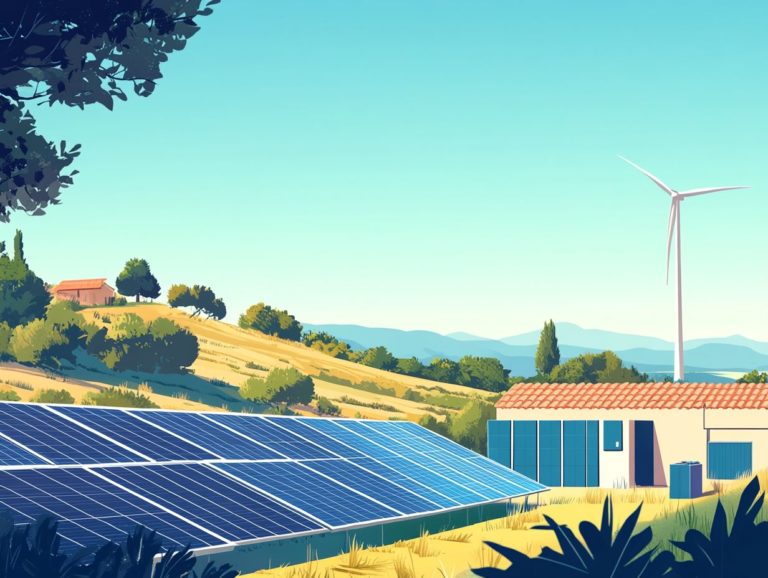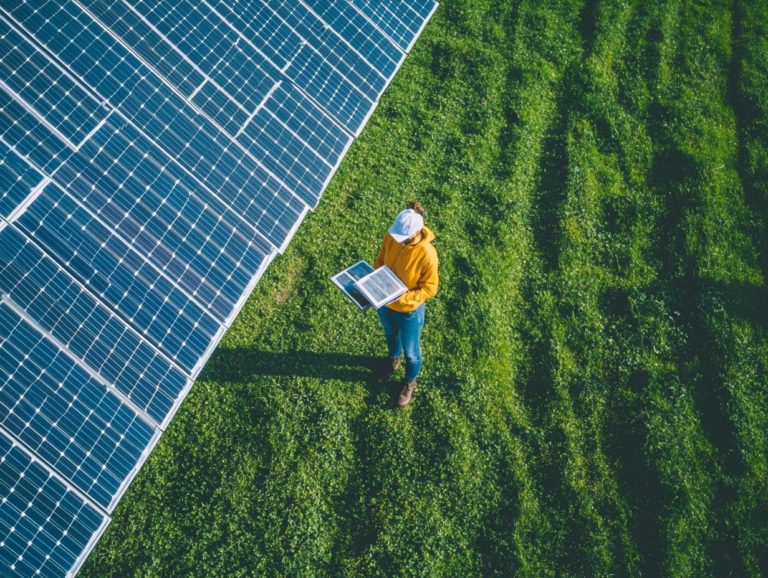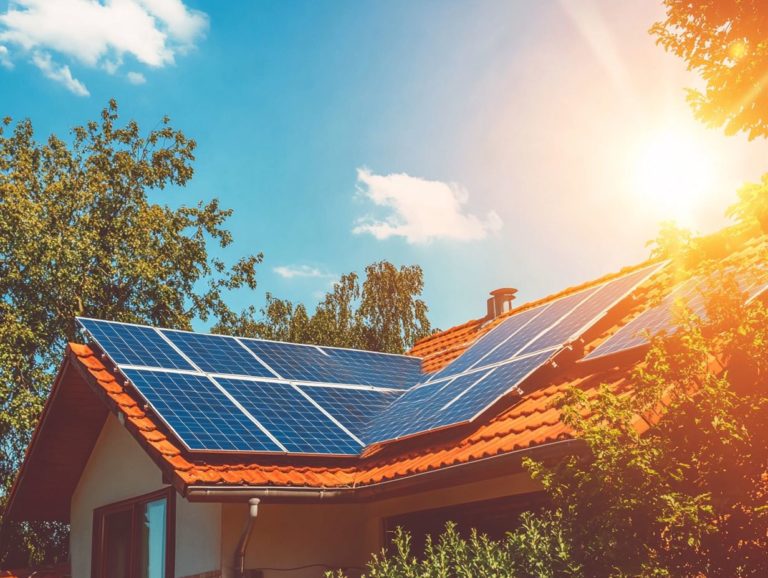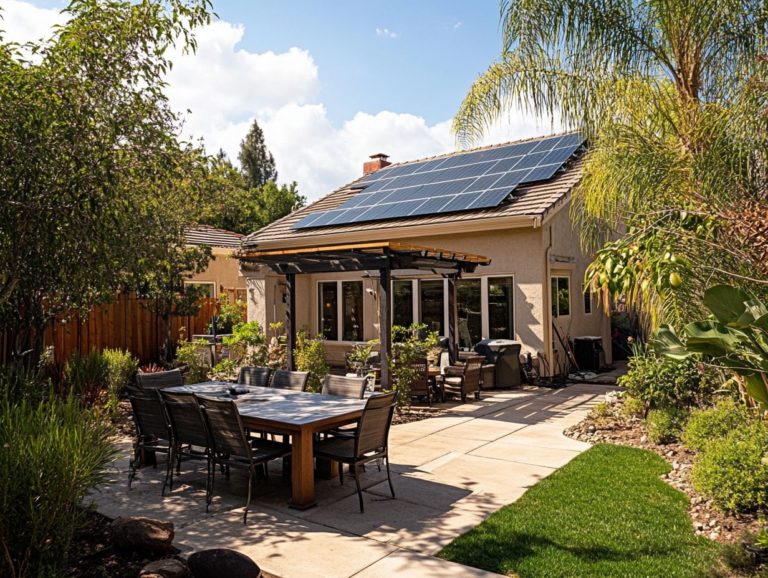“Solar Energy and Home Resale Value: What to Expect”
As homeowners increasingly embrace renewable energy solutions, solar power has become a choice that s hard to ignore. But beyond its clear environmental advantages, you might wonder how solar energy affects your home s resale value.
This article explores the essentials of solar energy, how it functions in residential settings, and its impact on market prices. It also offers guidance on preparing your home for solar installation, outlines the associated costs, and presents strategies to optimize your investment when it s time to sell.
Discover how harnessing the sun s energy can elevate your home in both sustainability and financial worth.
Contents
Key Takeaways:
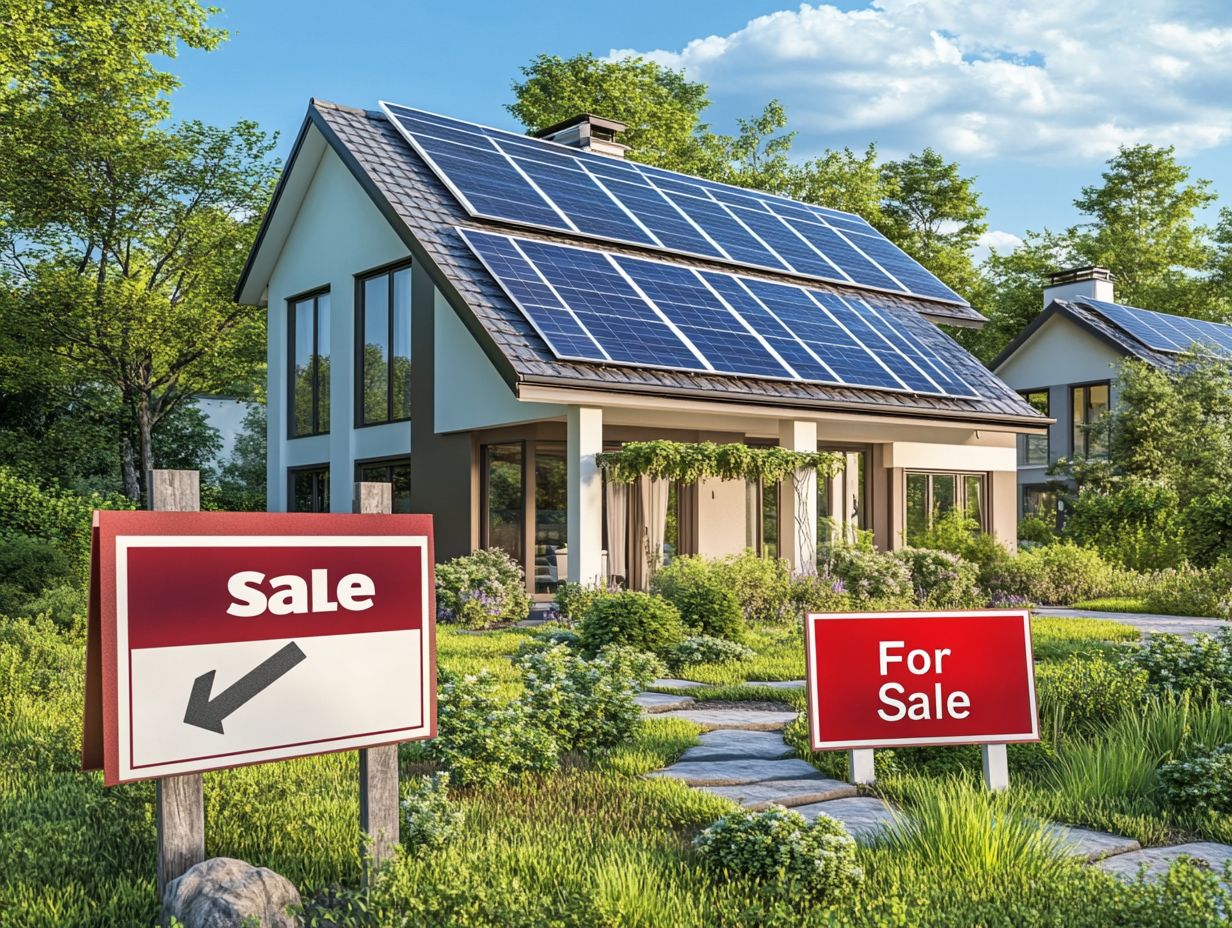
Solar energy can positively impact the resale value of your home by increasing its marketability and potential for higher selling prices. Factors such as location, size of the solar system, and quality of installation can affect the resale value. To maximize this value, it s important to assess your home’s suitability for solar, consider costs and financing options, and implement effective marketing strategies.
Understanding Solar Energy for Homes
Understanding solar energy for your home means knowing how solar panels capture sunlight and convert it into usable electricity. This process can lead to substantial energy savings and lower electricity bills, particularly in places like Seattle, Washington, where local incentives make solar energy systems even more attractive.
With rising electricity prices and the financial advantages of owning solar panels, more homeowners are embracing renewable energy solutions. In today s eco-conscious society, this topic has never been more relevant.
What is Solar Energy?
Solar energy is a remarkable form of renewable energy that captures the sun s rays and transforms them into electricity through solar panels, offering a sustainable solution for powering your home. This energy source is abundant and can be harnessed mainly through two systems: solar thermal and solar panels that convert sunlight directly into electricity.
Solar thermal systems use sunlight to generate heat, which can be applied directly for heating or converted into electricity. In contrast, solar panels convert sunlight directly into electricity using advanced semiconductor materials.
By incorporating solar panels tailored for these applications, you can develop an efficient solar power system that significantly reduces your reliance on fossil fuels. This contributes to environmental sustainability and helps lower your carbon footprint, promoting cleaner air for everyone.
How Does Solar Energy Work for Homes?
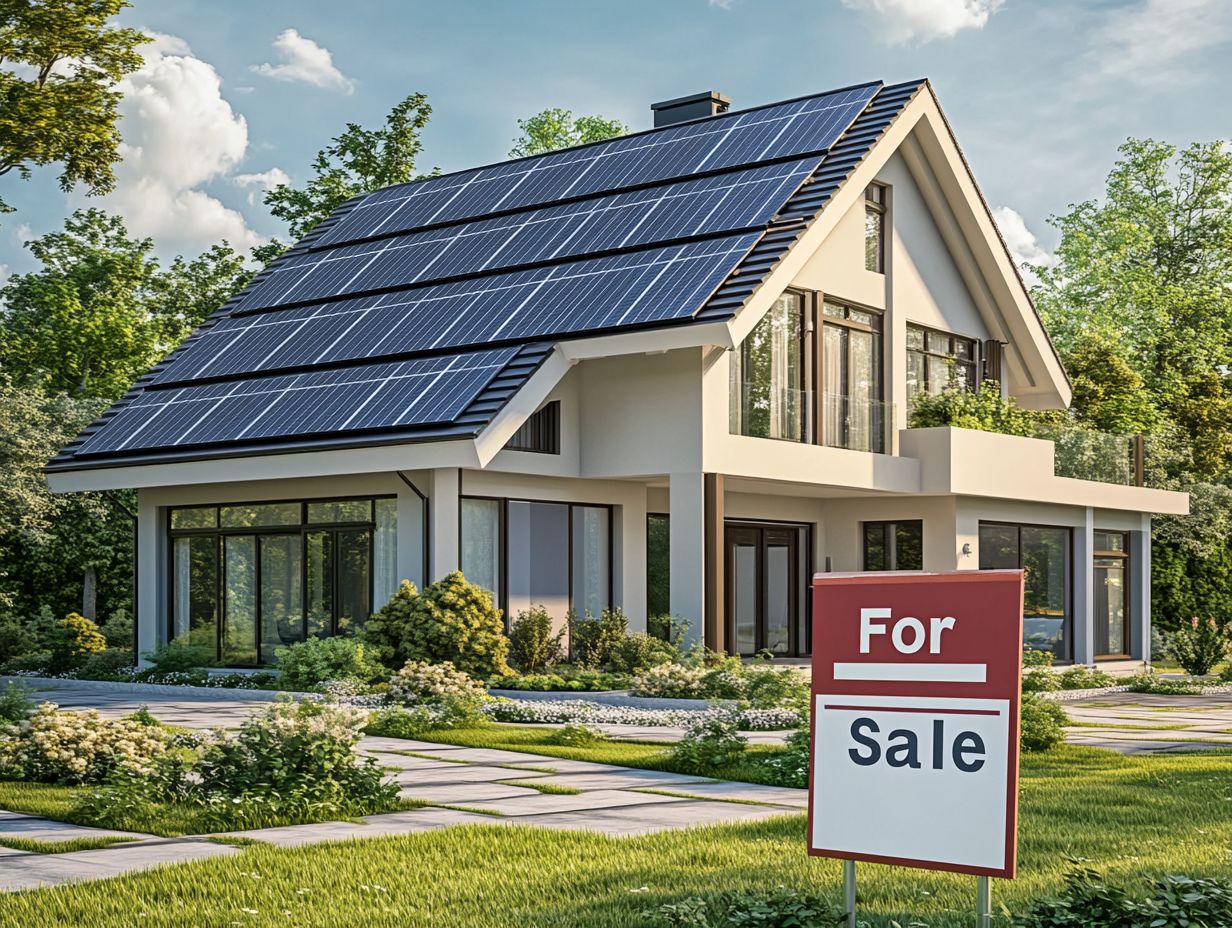
Solar energy systems work wonders for your home by capturing sunlight through solar panels and converting it into electricity. This can lead to significant reductions in your electricity bills and grant you a sense of energy independence.
The process begins when photovoltaic cells embedded in the solar panels absorb sunlight, creating an electric field that generates direct current (DC) electricity. This DC energy is then transformed into alternating current (AC) electricity using an inverter, a device that changes DC electricity into AC electricity, suitable for your household needs.
Installing these systems generally involves a few key steps:
- Mount solar panels on your rooftop or a designated area.
- Connect them to the inverter and your electrical panel.
- Ensure they have optimal access to sunlight.
By harnessing clean, renewable energy, you not only enjoy lower utility bills but also positively impact the environment by reducing your carbon footprint.
The Impact of Solar Energy on Home Resale Value
The influence of solar energy on the resale value of your home is significant. Research shows that homes with solar panels can experience an increase in value, enhancing their appeal to potential buyers, especially in markets that acknowledge the advantages of renewable energy and offer solar tax credits and property tax exemptions.
Properties featuring solar installations not only benefit from improved home value but also play a vital role in sustainability initiatives, as underscored by the REALTORS & Sustainability report.
Don t miss out on the opportunity to boost your home s value! Consider solar installation and explore its benefits for your home.
Statistics and Studies
Recent statistics from Zillow and studies conducted in states like California, New York, and Massachusetts show that homes with solar panels often command higher prices in the solar market. This reflects a growing demand for solar properties among buyers.
This trend is backed by a comprehensive analysis indicating that residential solar energy systems can add, on average, 4.1% to a home’s value. This translates to approximately $15,000 more on a median-priced property.
Interestingly, local market conditions significantly impact these figures. For instance, homes equipped with solar panels in California frequently command even higher premiums, largely due to the state’s commitment to renewable energy and heightened awareness of sustainability benefits.
State incentives, utility rates, and community attitudes also affect the value of solar panels. This makes it a crucial consideration for anyone looking to buy or sell a home.
Factors that Affect Resale Value
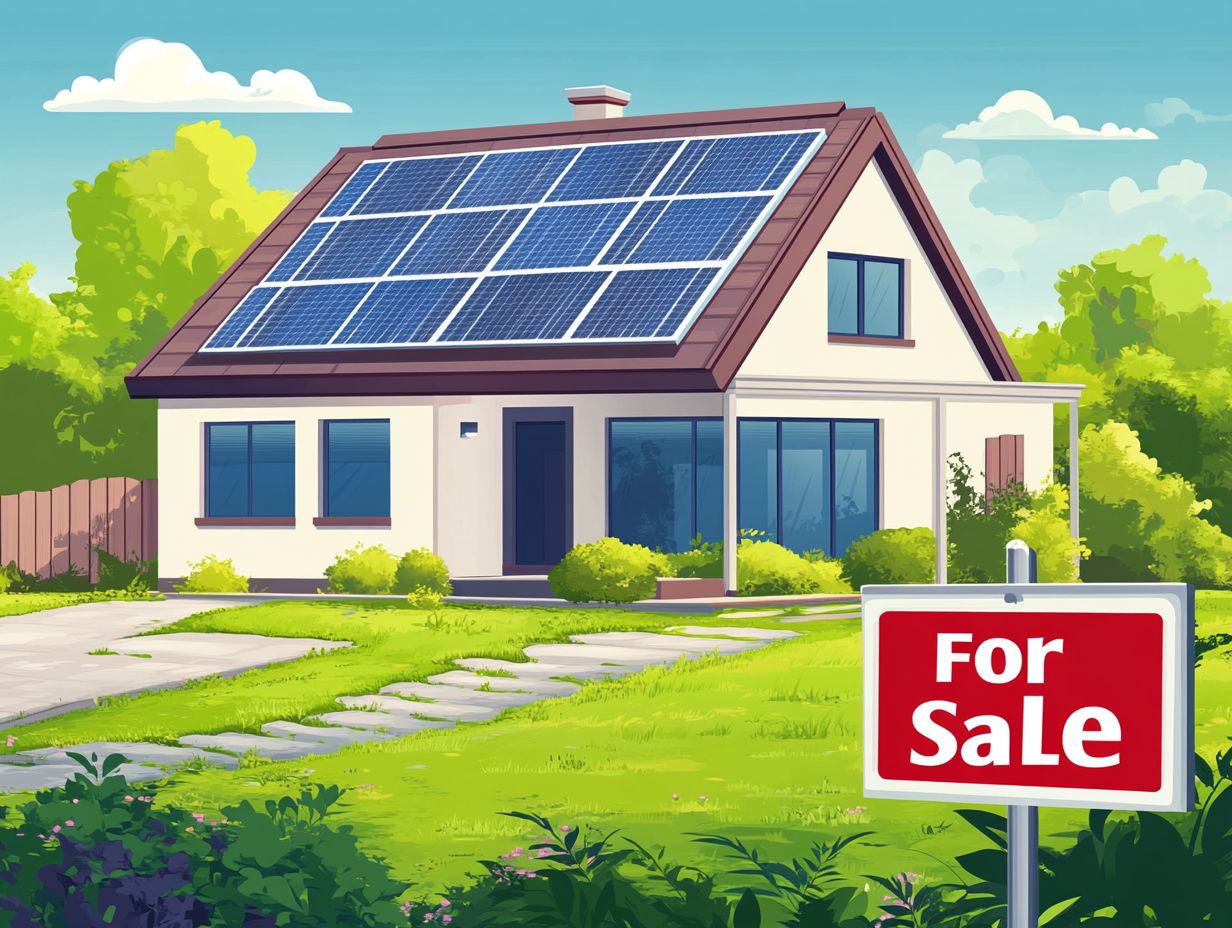
Several factors can greatly influence the resale value of homes equipped with solar panels. Consider the condition of the system, the appeal of the local market, and any property tax incentives or solar tax credits that could enhance financial attractiveness for potential buyers.
The quality of the installation is paramount. A professionally executed system tends to cultivate greater confidence and satisfaction among buyers.
The type of solar energy system you choose whether grid-connected or off-grid plays a significant role, catering to the specific preferences and needs of prospective owners.
Local incentives for adopting renewable energy can further sweeten the deal. When all these elements come together seamlessly, they can elevate property values, transforming solar-equipped homes into not only eco-conscious choices but also astute financial investments.
Preparing Your Home for Solar Energy
Getting your home ready for solar energy? Start by carefully checking if it’s the right fit for solar panel installation.
You ll want to understand the costs tied to solar energy systems. Delve into the various financing options and solar incentives available to homeowners.
By taking these steps, you can make informed decisions that pave the way for a sustainable energy future.
Assessing Your Home’s Suitability
Assessing your home’s suitability for solar panels requires a thoughtful evaluation of several key factors. Consider sunlight exposure, roof condition, and local property taxes to ensure your investment in a solar energy system is truly optimized.
Beyond these essentials, consider the angle of your roof. A pitch that maximizes sunlight capture can significantly boost efficiency.
Don’t overlook potential shading from nearby trees, buildings, or other structures. This can hinder performance and diminish overall energy generation.
Understanding your local climate is crucial. Areas with consistent sunlight typically enjoy the greatest advantages of solar technology. Additionally, it s wise to investigate local incentives, rebates, and permit requirements, as these can greatly impact the feasibility and cost-effectiveness of your solar installation.
By meticulously evaluating these criteria, you can make a well-informed decision about transitioning to solar energy.
Costs and Financing Options
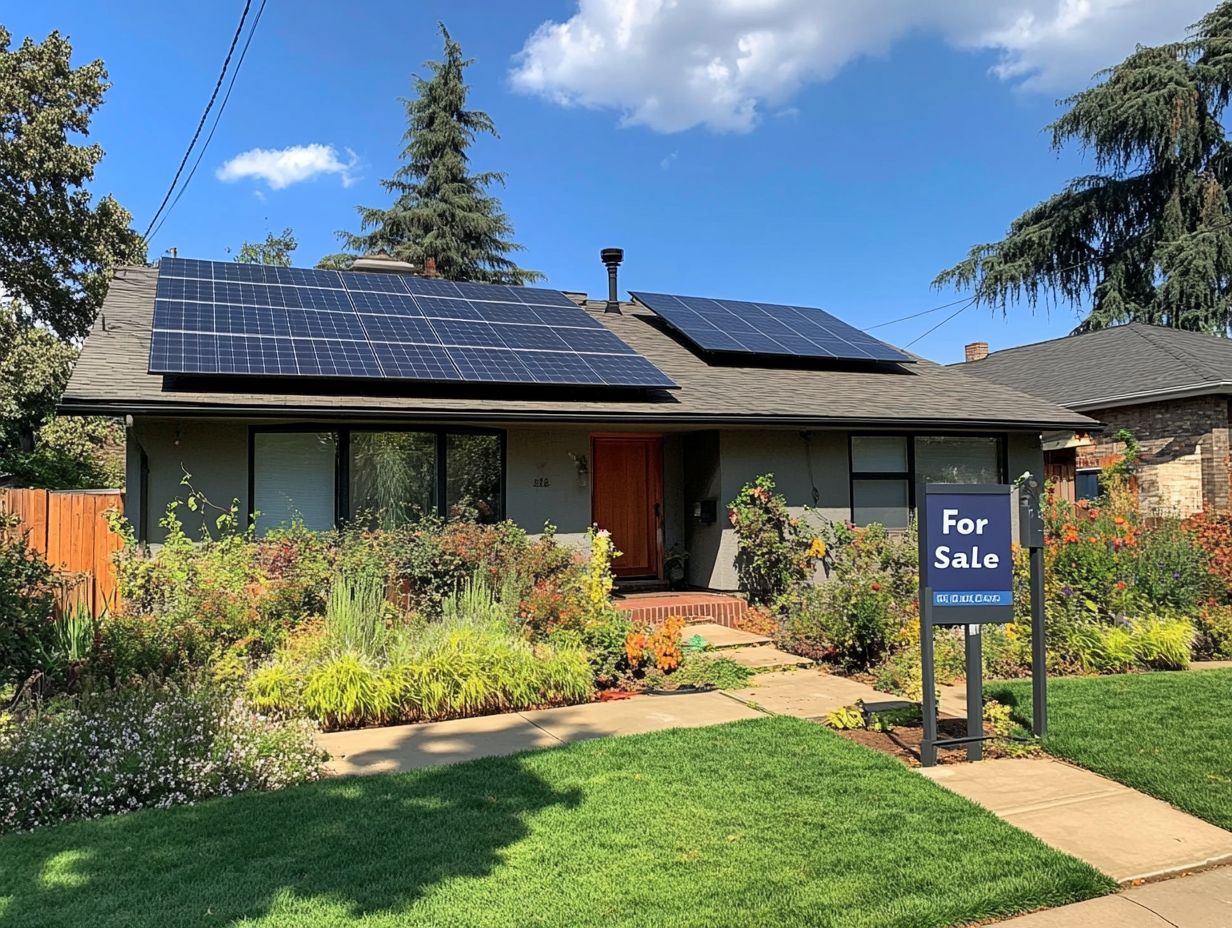
Understanding the costs and financing options for solar panel installation is essential for you as a homeowner.
While the upfront investment may seem considerable, it can often be balanced out by significant energy savings and available solar incentives.
Initially, those expenses might feel overwhelming, given that the necessary equipment and installation fees represent a substantial financial commitment.
However, exploring various financing methods like loans and leasing options can offer you the flexibility needed to make this transition more manageable.
Numerous solar incentives, including tax credits and rebates, can help lighten this financial load, enabling you to invest in a sustainable future without straining your budget.
Act now to take advantage of available incentives before they expire! Navigating these financial aspects is crucial for making an informed decision that paves the way for long-term economic and environmental benefits.
Maximizing the Resale Value of Your Solar-Powered Home
To maximize the resale value of your solar-powered home, adopt effective marketing strategies, maintain your solar panels, and stay aware of potential obstacles affecting property taxes and buyer interest.
By doing this, you position yourself to attract smart buyers who value sustainability and innovation.
Marketing Strategies and Tips
Implementing effective marketing strategies is crucial to showcase the resale value of solar properties. Highlight features like energy savings, solar tax credits (financial incentives for going solar), and sustainability to make a compelling case.
To capture the attention of prospective homeowners, leverage various channels, including social media, local community events, and online platforms. Use vibrant visuals and informative content to create an emotional connection, demonstrating how solar-powered homes lead to reduced utility bills and a smaller carbon footprint.
Highlighting testimonials from satisfied homeowners serves as powerful proof of the benefits. Sharing success stories from those who have enjoyed significant savings can greatly enhance your credibility.
Consider hosting informational seminars or workshops to educate potential buyers on the long-term advantages of investing in a solar property. This not only informs them but also makes the choice of embracing green living feel impactful and well-founded.
Potential Obstacles and How to Overcome Them
When selling your solar-powered home, you may encounter obstacles, such as concerns about solar panel maintenance, property taxes, and fluctuating buyer interest tied to energy savings.
These challenges can lead to hesitation among prospective buyers, who might worry about upkeep costs or question their overall financial investment. Local market conditions can also influence the demand for energy-efficient properties, complicating the sale process.
To navigate these issues effectively, provide detailed maintenance records, highlight available tax incentives, and clearly outline the potential savings on utility bills.
Working with a real estate agent experienced in the solar market can enhance your strategy. They can help tailor marketing efforts to emphasize these benefits, reassuring buyers and boosting your home’s appeal.
Frequently Asked Questions
- What is solar energy and how does it impact home resale value?
Solar energy is the conversion of sunlight into electricity, typically through solar panels. Homes with solar energy systems generally have a higher resale value due to potential savings on energy bills and the growing demand for sustainable homes.
- Will investing in solar energy increase the resale value of my home?
Yes! Studies show that homes with solar energy systems sell for an average of 4.1% more than comparable homes without them. This can equate to thousands of dollars in added value for a typical home.
- What factors determine the impact of solar energy on home resale value?
Several factors influence the impact of solar energy on a home’s resale value, including the location and size of the system, local energy rates, and the age and condition of the system.
- Do solar energy systems impact home resale value differently in different regions?
Yes, the impact of solar energy on home resale value can vary by region. In areas with high energy costs and strong demand for sustainable homes, the impact can be significant. However, in areas with lower energy rates, the impact may be smaller.
- What should I consider before installing a solar energy system for my home?
Before installation, research local regulations, assess your home’s location and orientation, and consider the costs and potential savings. It’s also wise to evaluate the potential impact on your home’s resale value.
- Are there any tax incentives or rebates for installing solar energy systems?
Yes! Various federal, state, and local tax incentives and rebates are available for homeowners who install solar energy systems. These can help offset initial costs and increase return on investment.
Start planning your solar installation today for better savings tomorrow! Embracing solar energy not only benefits you but also enhances the market appeal of your home. Remember, a solar-powered home isn’t just an investment in energy savings it’s an investment in a sustainable future.

